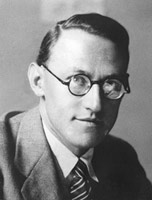



Morgenstern taught at the University of Vienna for nine years before fleeing the Nazi occupation for America. There, he joined the faculty of Princeton University, where he did some of his most memorable work on the role of uncertainty in knowledge.
The high point of this enterprise was undoubtedly his work with mathematician John von Neumann on the theory of games. Their book, Theory of Games and Economic Behavior (1944), revolutionized economics and created an entire new field of scientific inquiry -- game theory. This new science used the mathematical study of games and strategy to analyze real-world phenomena like arms races and the unpredictable behavior of economic markets.









